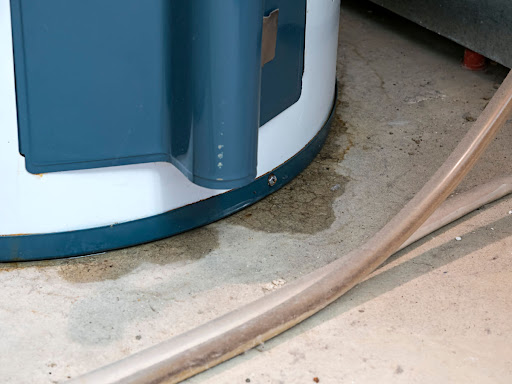As homeowners, we rely on water heaters to provide us with hot water for showers, dishwashing, laundry, and many other daily tasks. However, water heaters are prone to leaks, which can cause water damage and lead to costly repairs. That’s why it’s important to understand what causes a water heater to leak. It’s also crucial to know how to spot these damaging water leaks and what to do when they occur.
What Causes a Water Heater to Leak?
Several factors can cause water heater leaks. Some of the most common causes include faulty temperature and pressure relief valves, sediment buildup in the tank, and corrosion. Let’s go through each of these in more detail below.
Faulty Temperature & Pressure Relief Valves
Temperature and pressure relief valves (T&P valves) are designed to prevent water heaters from exploding. They do this by releasing water if the pressure or temperature inside the tank becomes too high. However, if the valve becomes faulty, it can cause water to leak out of the valve itself or from the bottom of the tank.
Sediment Buildup in the Tank
Over time, sediment buildup at the bottom of the tank can ultimately be what causes a water heater to leak. Sediment buildup can also cause the water heater to work less efficiently, reducing its lifespan. Regularly flushing the tank can help prevent sediment buildup and extend the life of your water heater.
Corrosion
Corrosion can also be what causes a water heater to leak. This problem can happen in both electric and gas water heaters, so it doesn’t matter which type of fuel your system runs on. Corrosion can occur inside the tank or at the inlet and outlet connections. If you live in an area with hard water or have an old water heater, corrosion is more likely to occur.
How to Spot Water Heater Leaks
The sooner you can spot a water heater leak, the less damage it will cause. Some of the signs of a water heater leak include:
- Puddles of water around the tank
- Damp or wet spots on walls or floors near the tank
- Rust or corrosion on the tank
- A decrease in your hot water supply
- An increase in your water bills
What to Do When a Water Heater Leak Occurs
If you notice a water heater leak, it’s important to take action quickly to prevent water damage and costly repairs. Here’s what you should do:
Shut Off the Power or Gas Supply
If you have an electric water heater, turn off the power to the unit at the circuit breaker. If you have a gas water heater, turn off the gas supply using the shut-off valve.
Turn Off the Water Supply
Turn off the water supply to the tank using the shut-off valve. This will prevent water from continuing to leak out of the tank.
Call a Professional
Contact a licensed plumber or water heater specialist to inspect and fix the leak. Attempting to repair a leaking water heater yourself can be dangerous and may cause further damage to the unit. If you’re looking for a team you can trust, look no further than our team of experts for your water heater repair in Dallas. You can count on us to get the job done right.
Schedule Your Water Heater Services Today
Water heater leaks can cause water damage and lead to costly repairs. By understanding what causes a water heater to leak and how to address this problem when it occurs, you can help ensure your water heater continues to provide you with hot water for many years to come. Remember to always call a professional if you suspect a water heater leak, as attempting to repair the unit yourself can be dangerous and may cause further damage.
If you think your leaky water heater is beyond repair, rest assured that Pure Plumbing can provide you with a dependable replacement. We take pride in providing the residents of the Dallas-Fort Worth area with high-quality services. Contact us today to schedule your traditional or tankless water heater installation in Dallas, TX, today!


